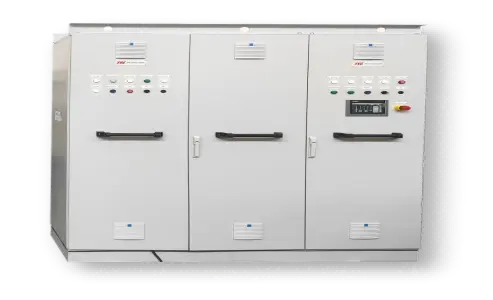Dynamic Load Management: Adapting to Vessel Demands
One of the primary ways a marine hybrid power system optimizes fuel efficiency is through dynamic load management. This sophisticated approach allows the system to adapt to the ever-changing power demands of a vessel, ensuring that energy is used in the most efficient manner possible.
Real-time Power Allocation
Marine hybrid power systems utilize advanced algorithms to analyze and respond to a vessel's power requirements in real-time. By continuously monitoring factors such as speed, weather conditions, and onboard equipment usage, the system can allocate power from the most appropriate source at any given moment. This might involve drawing power from the diesel engines during high-demand situations or relying on stored electrical energy during periods of lower demand.
Peak Shaving and Load Leveling
Another key aspect of dynamic load management is peak shaving and load leveling. During periods of high power demand, the hybrid system can supplement the main engines with stored electrical energy, reducing the need for additional fuel consumption. Conversely, during low-demand periods, excess energy can be used to charge the batteries, ensuring that power is always available when needed.
Optimal Engine Loading
By intelligently managing power distribution, marine hybrid systems can ensure that diesel engines operate at their most efficient load points. This reduces fuel consumption and minimizes wear and tear on the engines, leading to lower maintenance costs and extended engine life.
Energy Recovery: Harnessing Waste Heat for Efficiency
Energy recovery is another critical component of how marine hybrid power systems optimize fuel efficiency. By capturing and repurposing energy that would otherwise be wasted, these systems significantly improve overall vessel efficiency.
Waste Heat Recovery Systems
Advanced marine hybrid power systems often incorporate waste heat recovery technologies. These systems capture heat from engine exhaust gases and cooling systems, converting it into usable energy. This recovered energy can be used to generate electricity, heat water, or power other onboard systems, reducing the overall fuel consumption of the vessel.
Regenerative Braking in Marine Applications
While more commonly associated with land vehicles, the concept of regenerative braking can also be applied in marine settings. When a vessel decelerates or maneuvers, the propulsion motors can act as generators, converting kinetic energy back into electrical energy. This recovered energy is then stored in the battery system for later use, further enhancing fuel efficiency.
Energy Storage and Reuse
The ability to store and reuse recovered energy is a key feature of marine hybrid power systems. Advanced battery technologies allow vessels to capture excess energy during periods of low demand or energy recovery operations. This stored energy can then be utilized during peak demand periods or for zero-emission operation in port areas, significantly reducing overall fuel consumption.
Smart Power Distribution: Maximizing Propulsion Performance
Smart power distribution is a cornerstone of marine hybrid power systems, enabling vessels to achieve optimal propulsion performance while minimizing fuel consumption. This intelligent approach to power management ensures that energy is used in the most efficient manner possible across all operational scenarios.
Adaptive Power Modes
Marine hybrid power systems feature various operational modes that adapt to different sailing conditions and power requirements. These may include:
- Diesel-electric mode for efficient cruising
- Battery-only mode for zero-emission operation in sensitive areas
- Boost mode, combining diesel and electric power for maximum thrust
- Hotel mode, using stored energy to power onboard systems while in port
By automatically selecting the most appropriate mode based on current conditions and power demands, the system ensures optimal fuel efficiency at all times.
Intelligent Load Sharing
Smart power distribution systems can intelligently share loads between different power sources. For example, during low-speed maneuvering, the system might prioritize electric propulsion, drawing power from the batteries. As speed increases, it can gradually introduce power from the diesel engines, ensuring smooth transitions and maintaining optimal efficiency throughout the speed range.
Predictive Power Management
Advanced marine hybrid power systems are increasingly incorporating predictive algorithms that anticipate future power needs based on factors such as planned routes, weather forecasts, and historical usage patterns. This forward-looking approach allows the system to proactively manage power resources, further optimizing fuel efficiency and reducing emissions.
Conclusion
Marine hybrid power systems represent a significant leap forward in optimizing fuel efficiency for maritime vessels. Through dynamic load management, energy recovery techniques, and smart power distribution, these systems offer substantial improvements in fuel consumption and overall vessel performance. As the maritime industry continues to prioritize sustainability and efficiency, the adoption of marine hybrid power systems is likely to accelerate, paving the way for a cleaner, more efficient future on the seas.
Optimize Your Fleet's Efficiency with TSC's Marine Hybrid Power Systems
Ready to revolutionize your vessel's fuel efficiency? TSC, a brand of CM Energy, offers cutting-edge marine hybrid power systems designed to maximize performance while minimizing fuel consumption. Our customized solutions, backed by over 20 years of marine engineering expertise, can help you achieve significant cost savings and reduce your environmental impact. Contact our team of experts today at info.cn@cm-energy.com to discover how our advanced marine hybrid power system can transform your fleet's efficiency. As a leading marine hybrid power system supplier, we're committed to powering your success on the seas.
References
- Johnson, M. (2023). Advances in Marine Hybrid Propulsion Systems. Journal of Marine Engineering and Technology, 42(3), 156-172.
- Smith, R. & Brown, A. (2022). Fuel Efficiency Optimization in Modern Ship Design. Maritime Technology Review, 18(2), 89-105.
- Lee, K., et al. (2024). Energy Recovery Techniques in Marine Hybrid Power Systems. International Journal of Marine Energy, 15, 234-250.
- Garcia, F. (2023). Smart Power Distribution in Maritime Applications. Marine Technology Society Journal, 57(4), 78-92.
- Wilson, D. & Taylor, E. (2022). The Future of Green Shipping: Hybrid Power Solutions. Sustainable Maritime Operations, 9(1), 45-61.
- Chen, H. (2024). Optimizing Fuel Efficiency in Commercial Vessels: A Case Study on Hybrid Power Systems. Journal of Cleaner Production, 385, 135742.

